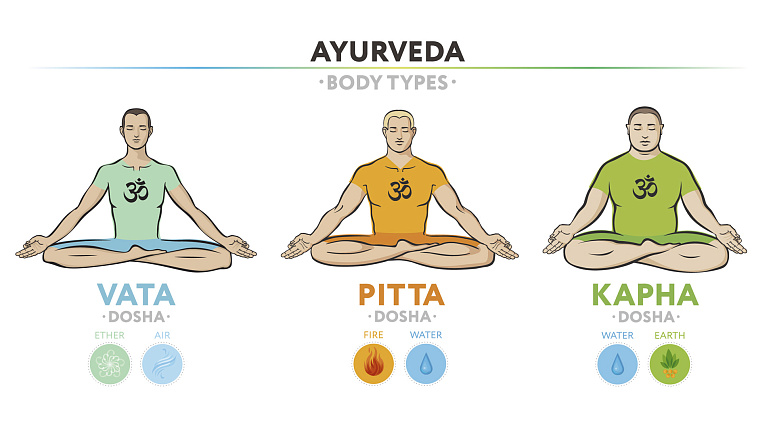It's no secret that you can't buy health, and you can't earn it. It needs to be preserved, it needs to be taken care of, and the best help in this, of course, is adherence to the daily routine. Getting up and going to bed at a certain time, regularly performing hygiene procedures and physical exercises, and proper nutrition will undoubtedly help to stay in good shape. Everyone who is interested in a healthy lifestyle now knows about this. Remarkably, the ancient sages, who spread knowledge about.
Ayurveda, spoke about the same.
For example, in Ashtanga-Hridaya-Samhita there is a separate chapter called Dinacharya Adhyaya, which tells how to organize your day in order to stay in good health (in Sanskrit, "dina" is a day, "acarya" is behavior). And this is not the only treatise with such recommendations, because the topic of health has always worried humanity. And even in those distant times, when these treatises were written, doctors urged not to wait for illnesses, but to take care of your body every day. To get the best result, you need to perform the necessary procedures at the most appropriate time of the day - at a time when nature itself promotes health care.
Doshas during the day
According to Ayurveda, a day can be divided into six periods of four hours, and in each period Vata, Kapha or Pitta dosha will prevail. Why is this important to remember? Each dosha is able to endow the human body with a certain energy, and if this energy is used correctly, it can either help or interfere with the implementation of the plan.
Vata dosha is responsible for movement, lightness, and changeability. Its period of the day is from 2 am to 6 am, as well as from 2 pm to 6 pm. At this time, it is easy to switch from one activity to another and get creative.
Kapha dosha is soft, sedative, stringy, slow, heavy and sluggish. The qualities of kapha are wise to use for leisurely activities or when you need to activate endurance, for example, during exercise, as well as in preparation for sleep. The hours of this dosha are from 6 to 10 am and from 6 to 10 pm. Pitta dosha stimulates digestion, helps transform one type of energy into another, and gives the body heat, passion.
Pitta is active from 10 am to 2 pm and from 10 pm to 2 am. It is good to fill this period with activities that require a lot of energy, including the most dense meal, so that there is enough fire to digest it.
If you keep these basics in mind, it becomes clearer why a Vaidya (Ayurvedic doctor) insists on performing certain actions in the morning or in the evening.
How to live according to Ayurveda?
Ayurveda recommends starting your day early in the morning - before sunrise. During this period, vata still dominates, and therefore it is much easier to get up before six o'clock than at 7-8 in the morning, when kapha steps in. In addition, morning hours are the best to perform hygiene procedures, according to ancient medicine. At night, the body had been working and directing all the resources available to it for cleansing, and it is very important to complete this process - to help get rid of toxins and waste. Just to enjoy physical health, it is important to take care of your mental state, and therefore the first thing to do after awakening is to recollect and realize yourself.
Don't jump out of bed when the alarm sounds! Stretch your whole body, feel it, take a few deep breaths and exhalations, smile at the new day and slowly get out of bed. This start to the day will set a leisurely pace and save you from stress. Further recommendations of Ayurveda do not have to be done all together and every day. Pick one or more, get used to them, adapt and when they become your rituals add more. The main thing is to follow the sequence: first, cleansing, then physical and spiritual practices, ablution, and after eating.
So, when you wake up, empty your bladder and, if possible, your bowels. If you have difficulty with this, drink 1-2 glasses of warm water to activate the necessary processes. You can add honey, lemon juice to the water, or even prepare a drink in the evening by brewing herbs or spices.
Before you drink a drink, take care of cleansing your tongue. Surely plaque has accumulated on it overnight, which can be easily removed with a special scraper or a tablespoon. Then brush your teeth and rinse your mouth with vegetable oil. Sesame is well suited, because it is rich in calcium, and therefore not only cleanses the oral cavity, but also strengthens the tooth enamel.
Clean your nose well, especially if you feel mucus has accumulated overnight, and then put oil drops into your sinuses, or at least lubricate them from the inside. To cleanse the nose in Ayurveda, there is a separate shatkarma - jala neti - washing with salt water. Just be careful with these procedures during the cold season! If you have less than an hour before going outside, it is best to postpone rinsing and nasal instillation so as not to chill your sinuses.
When washing your face, rinse your eyes thoroughly with warm water. Ayurveda also recommends using special healing ointments under the eyelid that cause tears to clear the eyes. But choosing such funds on your own is dangerous - be sure to consult your doctor.
If time allows, perform a self-massage. It is very helpful to periodically lubricate the entire body, from top to the bottom, with warm sesame oil or oil that is indicated by your main dosha. This massage is called "abhyanga" and it has a lot of advantages, which are recognized even by modern medicine. If you are limited in time, massage your ears, feet, joints and take a shower. If there is no time at all, still massage the ears with a drop of oil - this will invigorate better than strong coffee.
It will be pleasant and beneficial for women to have a facial massage, which will help to relax the muscles, which, in turn, will prevent the appearance of wrinkles. For the face, you can use both special oil and sesame oil.
By the way, it is preferable to wash off the oil with ubtan, clay or flour (diluting them with water to a paste state), and not with soap - such a tool will not only cleanse, but also moisturize your skin.
In addition, it should be remembered that the wadya recommends that men should carry out a complete ablution, including the head, every day, while women wash their hair 1-2 times a week, because water weakens the hair follicles.
When you are finished with cleansing, engage in physical and spiritual practices. Use a complex of asanas that suits your dosha, or do Surya Namaskar, but do not overload yourself. A morning warm-up should invigorate, not drain the body.
It is great to spend time on meditation and pranayama if you have already mastered these practices. It is the morning that is most favorable for concentrating the mind and filling the body with prana. Evening meditation will help you calm down and prepare for sleep. The best time for her is sunset, when day changes to night and the rhythm of life slows down.
Ayurvedic rules for sound sleep
A good sleep will be ensured not only by meditation, but also by proper nutrition during the day. The sages also well disclosed this question in their treatises, and the topic deserves a separate article. In short, breakfast should be light and sweet, lunch should be plentiful, because this is the main meal, and for dinner you can eat half the lunch portion, but no later than two hours before bedtime, so that the food has time to digest.
You should go to bed no later than 10 pm, while the energy of kapha is still active. You may have noticed that if you skip such a natural urge to sleep from nine to 10 o'clock, then closer to 11 pm, a second wind opens. Only, unfortunately, this feeling is deceiving.
It's just that it's time for pitta, and the body mobilizes forces to start the cleansing process. If you are awake at this time, then the body has to spend energy on your activities, and postpone cleansing until better times. Accordingly, in this case, many functions of the body are disrupted.
If you are used to ending your day closer to midnight, at the peak of pitta activity, then you probably faced insomnia, and you are familiar with the state when you really want to sleep, but you just can't stop the flow of thoughts. If you had a hard time falling asleep, most likely, you`ll get up during the kapha period, which is why you feel rather tired during the day. To return to the natural daily routine and forget about insomnia, you must first of all learn to go to bed earlier, and only then switch to early awakening.
Of course, falling asleep quickly can be difficult at first, so evening meditation and relaxation exercises can be used to help yourself. As an additional measure you may use mint tea or a warm milk with honey, if milk doesn't cause any indigestion. Unfortunately, very few people succeed in quickly adjusting to the new routine, but it is definitely worth the effort, because your health and longevity are at stake.




